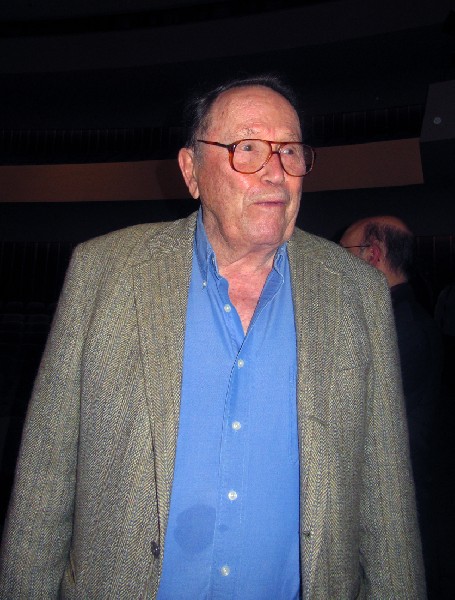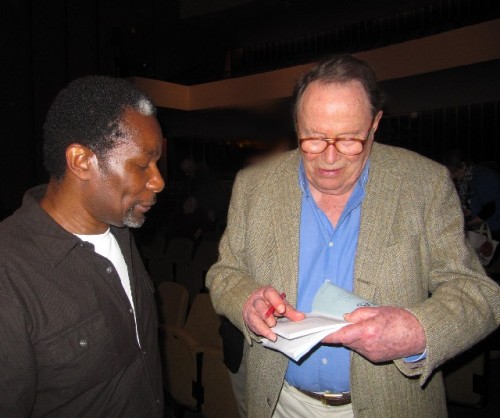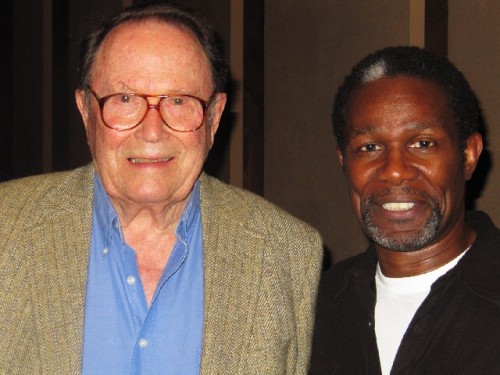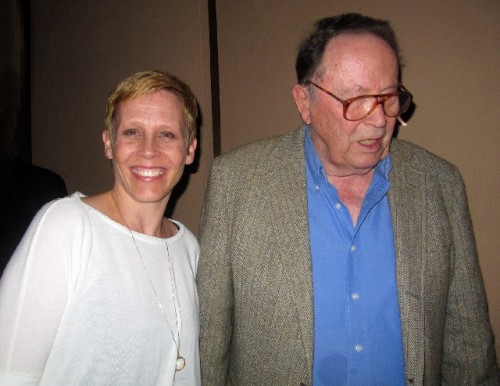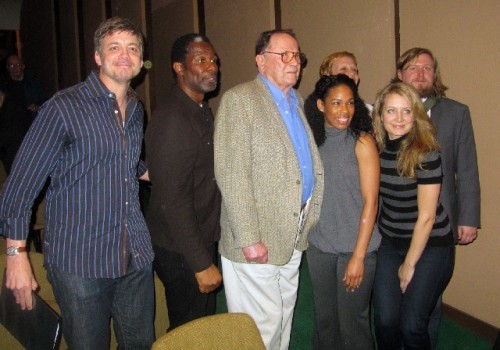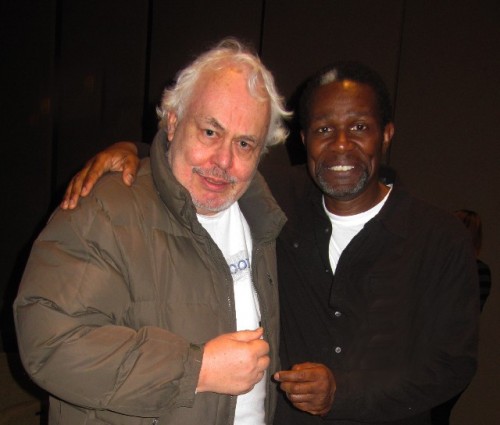John Douglas Thompson in WTF Reading at the Clark
Richard Wilbur's Translation of The Misanthrope
By: John Douglas Thompson and Charles Giuliano - Feb 29, 2012
Charles Giuliano Last night you played Alceste in a reading at the Clark Art Institute of the Richard Wilbur translation of The Misanthrope by Moliere (Jean-Baptiste Poquelin, known by his stage name Molière, baptised January 15, 1622 – February 17, 1673)). It was directed by Lucie Tiberghien and presented by the Williamstown Theatre Festival as a benefit for the Williamstown based charity Higher Ground.
John Douglas Thompson Wilbur was there last night. This week is his birthday and he will be 91. For people in theatre we are well acquainted with Richard Wilbur. Even when I was in school if we studied Moliere, did scenes from the plays, it was always his translation. We would compare his to others and there was no comparison. His was written in verse and rhyming couplets. What he has accomplished is world wide. He lives in the Berkshires but is known all over the world. After people look at his translations and everything else it is the only text they want to work with. He’s a resident of the Berkshires. To have him there and to do this reading at the Clark was a really special occasion.
It’s like meeting a living legend. It’s like being a young boxer and in the stands is Muhammad Ali. He’s there for your boxing debut.
CG You went back stage to get your copy of the text to have him autograph it. That seems to have some layers of irony.
JDT There was a chance to have him sign my script. I had that opportunity once with Arthur Miller. Death of a Salesman is one of my favorite plays. He was sitting just a couple of tables away from me during a dinner in honor of him. I was too scared to have him sign it. But I just wasn’t going to let that opportunity pass me by. These great geniuses. Not just of American theatre but they go beyond that. I just had to have him sign it. I just had to.
After the reading the cast went to dinner at Mezze and he hung out with us. He was there all night. He’s a trooper. He’s great.
CG Have you done Moliere before?
JDT No. Just in drama school. When we were being introduced to Moliere we did scenes. This is now going on 20 years ago. At least seventeen. Which is when I graduated from drama school. We looked at Moliere and what he was about. What he was doing with his plays. His response to social conventions that he was either accepting or rejecting. He was covertly political in his writing. If he was too political the King would shut him down. There are hidden messages in his plays and in this one they’re fairly overt. We studied him as a great French playwright and also as a great political playwright. We always studied Richard Wilbur’s translations. It was a no brainer.
We read other translations to compare and contrast. We read Chekhov and Ibsen and Moliere. There are many translations out there so when you start to investigate these plays you want to look at the translations and then come to some agreement as to what is best for your production. We were also being taught how to investigate translations; Chekhov and Strindberg. That’s how we came upon Wilbur because he’s one of the best. He’s done all of Moliere’s plays. All of them. You should intereview him. Don’t let him slip away. He’s major, major, major.
CG Currently Shakespeare & Company is doing Learned Ladies with his translation. He and Tina (Packer) did a talk back. It was during the matinee following opening night which we attended. So we didn’t participate.
JDT It’s great that there are two concurrent Moliere plays in the Berkshires even though one of them was a one night reading. It’s a great opportunity for audiences.
CG The S&Co production is hilarious.
JDT He gives you insights into France historically. Into what was going in during the eve of the Revolution.
CG You have built your career around performing Shakespeare (1564-1616). Moliere is to French literature and culture what Shakespeare is to English literature. Several generatuions separate them. But having just performed in one of the great plays of Moliere can you give us a capsule of how they compare and contrast?
JDT It all starts with the translation. I find some of Moliere’s characters just as contemporary as I find Shakespeare’s characters. When I am working on a Shakespeare character they are a little more human. Less archetypal. They seem to be really real. Albeit in The Misanthrope he really made it stand out from the other plays. These characters are less archetypal. In that same way that Shakespeare’s characters, for me, do not appear as archetypal. If you look at Tartuffe and Learned Ladies, and two or three others the characters are all fairly dimensional although they stem from an archetype. In The Misanthrope he broke with that and built fully dimensional human beings. That’s a similarity I found while working on that particular play. Because Wilbur’s translation is so poetical. That’s another similarity. In Shakespeare there’s stuff that rhymes and stuff that doesn’t but it’s all poetry. Most of the plays are in verse. As in this play so that’s another similarity.
I haven’t worked with any of the older Moliere plays but what I have found is that I ran into archetypes. So that was a difference between Shakespeare and Moliere. Up to the point of The Misanthrope I can find more similarities but prior to that I found archetypes where in Shakespeare I find non archetypal characters.
CG If you had to rank them?
JDT Shakespeare is the greatest writer in the world. I try to follow in his foot steps. I do. If Shakespeare is one person or twelve people. A woman or a man. I don’t really care. The reality is that we have these texts. We weren’t supposed to have them. They were saved and preserved. You’ve got to give this entity of Shakespeare its due. It’s the greatest writing in the world. You’ve got Shakespeare and you’ve got the Bible. These are the two texts which are studied world round.
CG You have been given a grant to study comedy for the next two years. Arguably, The Misanthrope is a comedy. As I have said to you before “Gee John you’re not a very funny guy. You make me think and feel but you don’t make me laugh.”
The test last night was, ok, here’s John in a comedy. Let’s see how this works. Alceste, the character you played is so dark, complex and inward. He seems like a tragic character caught up in an absurdly comic circumstance. The times that I laughed at your character seemed more like an ironic and absurd disconnect rather than true comedy.
JDT Yeah I see. I totally get that. I find that. There are different ways you can approach that. Wilbur talks about that in the introduction. You can play Alceste as a fool or he can be the hero. There are situations which are comic but it is not his responsibility to go out there and be funny. Because then the issues of the play don’t get across. There’s too much about the social conventions. There’s too much about the law suits. Too much about his rejection of human society and the way it is. Too much about flattery. These are the kinds of subjects Moliere was absolutely trying to address. He says look at us and look at what we are doing as a society. Is this right? Can you find another way? For me when I looked at Alceste I thought it may be OK as a play that has comedy in it but I think of it as a drama that has comedy rather than as a comedy that has drama.
CG Some of the other characters were over the top comedic.
JDT Absolutely.
CG It worked in this reading because you were a firm anchor that others were reacting to.
JDT You’re right. You’re dead on Charles.
CG Of course that made their performances all the more absurd and enjoyable. During act five when there was a meltdown about all the letters that Célimène (Jennifer Mudge) had written I saw you laughing. You seemed to be enjoying the absurdity.
JDT I may have been laughing at the two other suitors who had also been written letters by Célimène and duped. As Alceste I could laugh and I don’t see why I couldn’t. At their reactions about being duped which are different from mine. So laughter from my character wouldn’t seem so out of place. Although if I laughed last night I don’t think I was conscious of doing it. That could work in a performance.
CG It seemed like you were just having a good time and enjoying their comic performances. It was the nature of an informal reading.
JDT It wasn’t a full production of course.
CG Since there was so little time for preparation and rehearsal I thought you brought a nuanced interpretation to the character. In a reading it was astonishing to see you feeling Alceste. Bringing so much variation to his actions. It was another of your stunning performances even though an unfinished work.
JDT Thanks you Charles that means so much to me. Particularly from you as you have been watching the body of work. And I count this as a part of the body of work. Albeit that it was a reading. But for you to recognize that means a lot to me.
CG Does this pique your interest in doing a full production of Moliere?
JDT Oh yeah. I want to do this. Another production I would like to do and I see these characters are related almost. Shakespeare’s Malvolio from Twelth Night and Moliere’s Alceste from The Misanthrope. I would like to work on both of those characters and eventually be involved in full scale productions. Maybe we can do The Misanthrope up there. It’s always there in the back of my mind. Maybe if this works out well. If there’s the time and there’s the interest maybe we can do this.
CG Last year for the February reading at the Clark Jessica Stone directed Last of the Red Hot Lovers by Neil Simon. At the time I asked her if there was any chance she would do it during a WTF season. She indicated that she and Jenny were discussing options. It didn’t happen last year but it is penciled in for the coming season. Her first turn at directing was A Funny Thing Happened on the Way to the Forum which was a huge hit under artistic director Nicholas Martin. The reading of the Simon comedy was wonderful and I am sure it will be a highlight of the season.
JDT If informal readings act as dress rehearsals I am glad to have been involved this way.
CG Of course I am purely speculating but there is a precedent. There are other examples of readings and work shopped productions finding their way into the season. That happens with all of the companies. Everyone is developing new work and looking at potential productions or reworking of the classics.
Coming back to the character of Alceste he is so hard and inflexible in his world view. And yet totally undone by a woman.
JDT I love that. That complexity for me is real. It felt like he’s so extreme. He lives in a world of extremes. He’s so inflexible. The response has to be this or that. But with this woman you can’t control your feelings and go back and forth and back and forth. You’re like a rubber band. It’s a wonderful dichotomy.
CG In your exchanges with Célimène she gives as good as she gets. It is such a typically male vs. female dilemma. You catch her in a misdeed and she counters with how ungentlemanly of you to press the issue. When you nail the deed they accuse you of being a brute and offering them no freedom or trust. Your argument goes right out the window.
JDT All I can say is “I still love you.” I know you’re undoing me but I still love you. That character kind of needs that. If you are going to be inflexible in all things about life outside of love and he is that inflexible with his love you would have a one note character. It seems to me. So adding that element. That’s Moliere, he added that and gave it dimensionality. That’s why as I mentioned before, in this play, specifically, he really began to move away from archetype. He began to craft mature characters with subtlety and nuance.
CG Fully evolved men in relationships come to learn that it is not in our best interest to win arguments with the women we love. You may win the argument but at what price.
JDT (both laughing) You loose the battle. By the time we get to the end of the play the big thing for Alceste is he rejects his love. Célimène says, here, I will give you my hand in marriage, but I won’t go away with you to an island or wherever you are going to seclude yourself. For Alceste to deny that, given how much he loves her, and how much her love controls him, that was a big thing for him to turn away from that. To decide I’m not going to take your hand in marriage. That’s over for me. I’m going to go away by myself and hopefully be satisfied living in a world that doesn’t have all the crap I have to live with here. I thought that was a big step because you never thought that he would be able to detach himself from his love for her. He made the gesture of saying it’s over. That was a huge thing for him.
CG There is something very French about Célimène. We don’t know if she loves Alceste. She insists on the right to have other suitors and that it is none of his business. In that society marriage was the first step toward taking other lovers. Marriage allowed for security as long as they played by the rules. They married for position and power. They sought love outside of marriage and family. The idea is I don’t care what you do on Saturday night but be home in time for Church on Sunday morning. Anna Karenina did not play by the rules and paid the ultimate price.
JDT Célimène as a mysterious French woman.
CG Through Célimène it seems that Moliere is playing with the French notion of love as sport. She is letting Alceste know that she is within her rights to play with the hearts of suitors. That she is doing nothing wrong and resents his accusations. Moliere is also commenting on courtly manners and flattery.
JDT Moliere does not like that. He is making a firm statement that that kind of flattery is not good. It leads to imbalance and chaos. It leads to lies and lack of integrity. It leads to a destruction of virtues. You see it in the play. Some of the characters don’t have any virtue.
CG Frankly, I didn’t think the sonnet was that bad.
JDT I know but because Oronte (Michael Chernus) is a competitor in love. That’s when I began to figure out, you know, this is a good sonnet, but this is my competition, I need to blast it away. To give him a taste of what I would do and set myself above him. I think Alceste is jealous about a lot of things. He’s jealous of her friends and these men who want to be her lovers. He’s set himself up in a world that just contains himself. I don’t think he’s aware of it. It’s extreme but almost subconscious. What do you mean? This is the way people should be. He’s doing nothing but following the righteous path. That’s funny. He’s almost unaware of it. If he were aware of it then it wouldn’t be funny. He may be conscious but not conscious enough that he may be cutting things off. By being so extreme and not having any liberality. That’s the lesson maybe that he’ll learn when he goes off to this island. Maybe he’ll become a Buddhist monk. I don’t know. But maybe he’ll learn something about life and humanity that I suspect will bring him back into life and society.
CG We felt sorry for you (Alceste). Driving home we discussed how the play certainly does not have a happy ending.
JDT That’s how Moliere wrote it. I don’t think it should be happy. Here’s a guy who just decides to give up.
CG It’s a glum and morose way to end a comedy. Which makes me wonder if it is a comedy?
JDT It’s poignant. Ending it that way gives people a lot to think about. For two and a half hours we’ve been invested in this very funny thing that’s going on. Maybe some will call it a comedy and maybe some won’t. But by the time we come to the end and Célimène gets her comeuppance. And Alceste decides to go away and be by himself. Hopefully what the audience is left with are some real practical things to think about. That came out of this so called comedy. That’s a great thing about it.
CG In that society women had no power and yet the aristocratic woman had all of the power. I tend to think of them as matadors, with balletic grace allowing the bull to charge by. To wear men down like great snarling beasts. Then behind the cape to thrust the concealed blade deep into their hearts. Is that not Célimène? It’s all about a ballet with feminine courage and the pass. That was very much the style of the French court. That amorous deadly sport. By comparison the British court at that time was boring and dull.
In French society you live by your wits. Consider Rostand’s Cyrano de Bergerac. That wonderful and hilarious monologue when a gentleman dares to insult the size of his nose.
JDT It’s all wit.
CG A woman’s power was measured by her ability to manipulate language. Her clever conversations at the salons and wonderful letters such as those Célimène wrote to her suitors. She was clever and cunning in writing them. Even though she was exposed through the outrage of those who received them when the scheme was revealed.
JDT That’s what Célimène does. Although she explains to Alceste that she is keeping these people close because they can help her out at court. That’s an idea and philosophy that Alceste outright rejects. I’m not doing that. I have Eliante (Angela Lewis) who loves me I’ve got Arsinoe (Johanna Day) who loves me. I’m not leading them on in the way that Célimène is leading on these gentlemen callers. I’m not leading anyone on. I’m saving myself for Célimène and expecting the same from her. It just makes sense. It’s almost part of me. Why am I dealing with this? Why am I even here? It just doesn’t belong. It doesn’t fit. But that’s the comedy. He’s just reacting to a situation which he finds absurd. But the audience finds the absurdity and that’s what they laugh at. But I was really steering away from making Alceste just a bumbling fop, fool, idiot. Who is just there to be the butt of everyone’s joke.
CG That wouldn’t be you and you have to bring yourself to the character.
JDT People do that. Don’t get me wrong because that’s been done. It’s still a choice but I find it less interesting.
CG Based on the character I saw him portray, from the same period, in La Bete, I am trying to imagine how Mark Rylance might play Alceste.
JDT He could play both so well and combine the two. Never before have we seen an Alceste rooted in both worlds. I’m sure those would be the titles of the reviews. I have studied some of his performances like Richard II and some stuff he did with Hamlet. He’s one of our great actors.
CG It would seem that a challenge for you as an actor in doing these period pieces of Shakespeare and Moliere is that you are presenting them to American audiences that are generally undereducated and unfamiliar with their context. Often as a critic I feel that I am having a very different experience than the audience. That may be the difficulty of doing Shakespeare and Moliere.
JDT Yeah. I recognize that. That’s a challenge. It’s actually quite wonderful that's how it's set up. It makes the work worth doing continually. To bring some change about in that area. When I was in England there’s Shakespeare on every corner. That particular culture is very literate about Shakespeare and his plays. The language. The characters. The ideas. What’s happening behind the plays. That can happen here. There’s no reason why that can’t happen here. I’m dedicated to bringing that about. It’s a noble life’s worthy goal. I’m not quitting.
CG I often feel that you take that archaic, poetic language and manage to speak it as contemporary vernacular. The cadence emerges as a kind of plain speech. It is natural on the ear and conversational. Everyday speech but through Shakespeare’s poetic language. The approach is to make the text more accessible to a contemporary audience.
JDT It’s heightened language so I strive to keep the heightened language there but in the delivery of it to make it sound like I’m talking today. It’s a very complex thing. You’re juggling in a sense. You’re keeping a lot of balls in the air because you want to keep the heightened language there. You want to keep the poetry there. But you don’t want to be standing on stage in some declamatory way. Because then no one can get beyond the language to the human person speaking it.
This language if you do it properly reveals the human person. It reveals the soul. So there’s nothing to be afraid of. For me I’m not trying consciously to switch it or to trick people. I’m just trying to surrender myself, this is very important, I try extremely hard to surrender myself to what I am performing. To give myself over to the language. Just fall right into it. It’s going to catch me and hold me up. So I’m not trying to do anything technical. Other than to surrender to the text.
CG Is there a theatrical paradigm here? Is there an American style? Is there a movement? Is it an aspect of contemporary training? Or is it your individual take on it?
JDT From all that I have learned and I am still a craftsman and am still learning. The way that I have been able to distill all of my education up to this point has come to surrender. Don’t try to man handle it. Do not try to control it. Do not try to impose yourself on it. Surrender to it and then you will find the serenity and grace that’s already in the text. It’s there for you. Stop fighting. Just don’t fight it. Surrender. Don’t fight me the text. Just embrace me. It will show you where to go.
CG Is that an aspect of your training?
JDT It’s the culmination of my training. How I have distilled it in my own mind. It’s like you and all of the art you have seen. At some point you see the common denominator and surrender yourself to it. And then it will reveal itself to you. When it reveals itself to you then you have it. You have it as a friend, a partner, a lover. It’s there for you. Once you try to control it or impose yourself. To think that you are smarter than what it is then it will defeat you every time.

